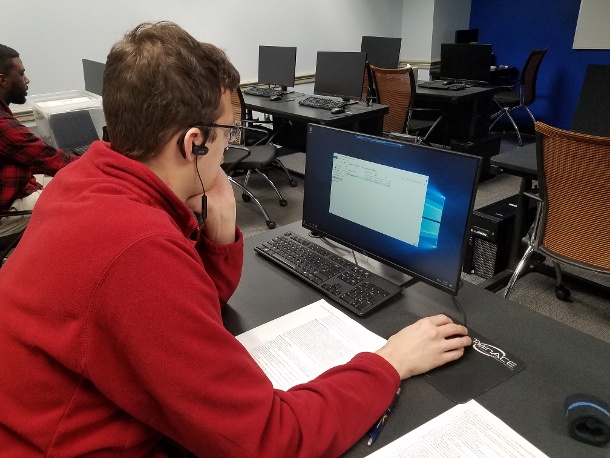
Microsoft’s cloud business is booming: According to recent data, revenue growth is up 62 percent over the previous quarter for Azure. This dovetails with the growing need for cloud-certified IT professionals: 94% percent of businesses say they’re struggling to find top cloud talent — and the challenge is growing as environments diversify across multiple cloud providers.
In the Washington, DC area, meanwhile, the demand for IT talent at large continues to grow thanks to both federally funded technology projects and IT startups looking to leverage the expanding resource network across the Dulles Technology Corridor.
So what’s the best bet for IT pros? Should they invest in Azure Fundamentals training, or choose another route? Here’s what you need to know about Azure Fundamentals’ core concepts, its certification exam, career outlook, and potential benefits in the Washington, DC area.
What is Azure Fundamentals?
The Azure Fundamentals certification — designated AZ-900 — is part of the new Microsoft Azure Certifications Pathway that was introduced last year. This new framework eliminates certain role-based specializations and instead replaces them with more applicable roles such as Azure Administrator Associates, Solutions Architects, and Security Engineer Associates.
No matter which specialization path you choose, however, they all share the same starting point: Azure Fundamentals. This entry-level qualification has no experience or skill prerequisites and is designed to give IT pros an overview of the Azure cloud environments. Key concepts include:
- Getting started with Azure
- Azure management tools
- Virtual machines in Azure
- Web applications and cloud services
- Creating and configuring virtual networks
- Understanding Azure cloud storage
- Microsoft Azure databases
- Using and managing Azure Active Directory
After successful completion of the Microsoft Azure Fundamentals exam, IT pros earn the Microsoft Certified Azure qualification. While this certification is not necessary to pursue more specialized Azure training, it does provide essential knowledge and skills to streamline learning and completion.
How Hard is the Azure Fundamentals Exam?
The Azure Fundamentals exam is not considered particularly difficult in comparison to other entry- or mid-level examinations. It’s worth noting, however, that if you have minimal experience with cloud computing services in general or Azure specifically, this exam will pose a challenge. While pre-test training is not a requirement, it’s worth considering Azure Fundamentals online training courses that include both expert instruction and hands-on labs to boost your chances of successful exam completion.
The exam itself is between 40 and 60 questions long. Candidates have 85 minutes to complete the test, and a score of 700 or above is required to pass. The examination covers six broad subject areas:
- Benefits and challenges of cloud computing services
- Key differences between SaaS, IaaS and PaaS
- Differences between public, hybrid and private cloud computing models
- Fundamental architectural elements of the Azure platform
- Core Azure products, services, and solutions
- Pricing and support options for the Azure cloud computing framework
Candidates should also be aware that Microsoft is updating this exam as of May 28, 2020.
What’s the Career Outlook for Azure Experts?
As noted above, Microsoft’s Azure platform is enjoying substantial growth as the service delivery model matures, and businesses are already running Microsoft OS and applications across their IT stacks leverage this familiar framework to boost their cloud impact.
For IT pros, this means Azure Fundamentals certification can help open the door to a wide variety of technology careers, especially when paired with more specific development tracks. Some potential job options include:
- Azure Systems Administrator — Azure sysadmins are responsible for the installation, configuration, and management of Azure systems across the organization. They need in-depth knowledge of troubleshooting and monitoring processes to ensure optimal cloud performance. Entry-level admins typically earn around $80,000 per year, while senior administrators can make $125,000 or more.
- Azure Developer — Developers are responsible for building, testing, and deploying apps in the Azure environment. They’re often on the cutting edge of cloud technology developments to help identify and solve emerging challenges by creating purpose-built apps. Salaries start at approximately $115,000 and can reach $175,000.
- Azure Solutions Architect — Architects are responsible for demonstrating the value of Azure deployments to users and creating adoption plans that deliver the most value for Azure investments. This role requires a mixture of both technical and consulting skills, and salaries range anywhere from $90,000 to $150,000 depending on your specific role.
Is this Certification Worth It in Washington, DC?
Washington, DC, is now a hotbed of tech innovation with multiple events each month designed to showcase the work of new startups. In addition, federal government adoption of cloud services is also on the rise, and with many agencies relying on Microsoft-based software and database deployments for day-to-day operations, there’s substantial opportunity for Azure-certified staff in the Washington, DC area.
Bottom line? Azure is on the way up, and it’s worth getting in on the ground floor with the Microsoft Azure Fundamentals certification.
Leave Your Comment Here